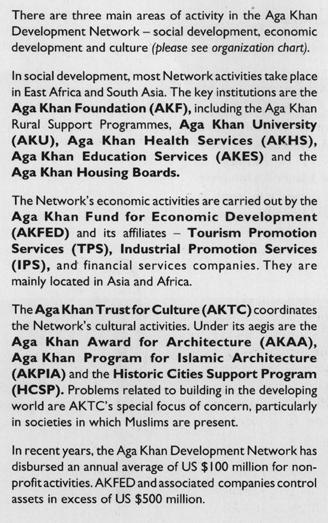

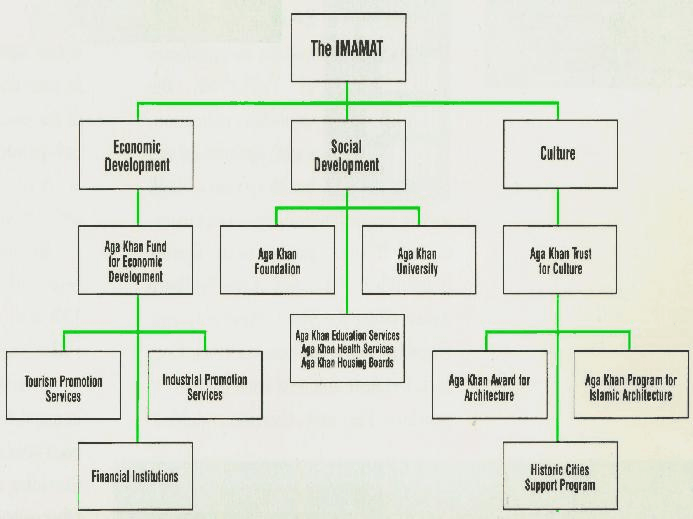
Many of the institutions that are now part of the Network were originally created in the late nineteenth century by the grandfather of the Aga Khan. They were established to meet the needs of the Shia Imami Ismaili Muslims living in South Asia and East Africa. Today, under the guidance of the present Imam, His Highness Prince Karim Aga Khan, the Network's institutions have grown beyond that geographical core. Their services are open to people of all faiths and origins. The fulcrum of the Network's institutions have grown beyond that geographical core. Their services are open to people of all faiths and origins. The fulcrum of the Network's activities, however, remains the Ismaili Community-its traditions of volunteer service, self-reliance, and the leadership of the hereditary Imam.
The Imam's responsibilities involve not only interpretation matters of faith to the Ismaili Community, whose member now live in both the industrialized and developing worlds, but also relating that faith to conditions in the present. For the Aga Khan, this had led to a deep involvement with development, seen as a process in which economic, social and cultural factors converge to determine the quality of life. The institutions that the Aga Khan has founded since 1957, when he succeeded his grandfather to the Imamat, reflect that sense of development's complexity. While all of them pursue specific mandates in social, economic and cultural development, they also work to identify ways in which these different pursuits can interact, mutually reinforcing one another.
The Network's institutions share common characteristics. Many initiatives originally came to exist through the energy, dedication and skill of volunteers, and both volunteer and professional staff are essential to the functioning of Network organizations today. They draw upon the talents of people of all faiths, and work to develop the competence of both volunteer and remunerated staff on an on going basis.
The different sectors of the Network also share common principles. Whether in health, education, architectural revitalization or industrial development, Network organizations seek to reach people without access to services, supplementing the efforts of government and other providers but not substituting for them.
They function through the participation of local people at all levels, in defining services needed, providing them, and evaluating their effectiveness. Their mandates are both urban and rural-Network organizations are present not only in many of Africa and South Asia's expanding cities but also in remote rural areas. Enabling people in rural areas to create the services they need and have access to the opportunities they want is a particular focus of the Networks activity.
Alongside their specific goals, Network projects are required to meet rigorous criteria for institutional development and management. Often initiated and always supported by the communities they serve, they aim to develop viable institutions and programmes that can become self-sustaining. By building strong institutional objectives into its projects, the Network aims to build permanent capacities for service in developing societies.
This institution-building aim is served by links between Network organizations, both within and across sectors. It is also furthered by partnerships with organizations outside the Network, both in the north and the South. In the linking process, the Ismaili Community's geographical spread and cultural diversity act as a powerful stimulus-its presence in North America and Europe, as well as in Africa and Asia, has created a unique bridge between the developed and developing worlds that is one of the Network's greatest strengths.
Finally, the Aga Khan Network seeks to strengthen the role of the private sector in the developing world. In its approach to the development process, support for private sector initiatives has intrinsic importance. From non profit,non-governmental organizations to business enterprises, the private sector plays an essential role in national life. It can become especially effective in cooperation with governments that encourage its contributions by fostering what the Aga Khan has called an "enabling environment" favourable legislative and fiscal structures. In all areas of social, economic and cultural development, building enabling environments is one of the Networks foremost goals.
The Imamat's concern to stimulate economic activity that can improve the quality of life has given rise institutions that now span several continents and sectors of activity. From self-help finance and insurance companies founded for the Ismaili Community at the turn of the century, the Imamat's economic activities have grown to include initiatives in industrial development and tourism promotion as well as financial services. Located principally in Asia and Africa, they serve broad national constituencies with companies and projects that range from food processing to telecommunications.
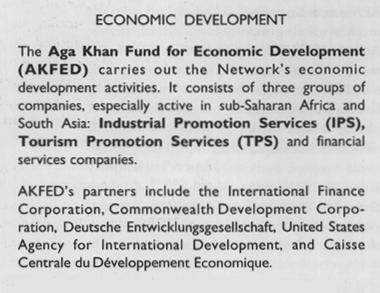
The Aga Khan Fund for Economic Development (AKFED) carries out these Network activities in economic development. It looks for projects with development potential as well financial viability and works to build them into companies with lasting institutional strengths. Its criteria for project design emphasize both technology transfer and local resource use; it seeks to harness both international expertise and local know-how to the task of improving living standards in the developing world.
The efforts of the Ismaili Imams in health and education go back to the Fatimid Empire, when they founded the University of Al-Azhar. Working within these Islamic traditions of social concern, the Aga Khan has fostered the development of a growing network of institutions and activities in health car, education and rural development. Today the main Network institutions working in social development are the Aga Khan Foundation, Aga Khan University, Aga Khan Health Services and the Aga Khan Education Services. Each has a specific mandate.
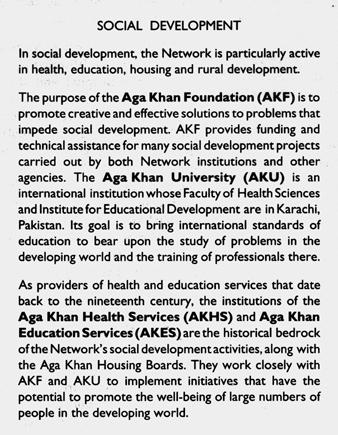
Founded in 1967, the Aga Khan Foundation (AKF) is now a major non-governmental organization (NGO) active in health, education and rural development. With roots in the third world and support in the West, it cooperates with more than thirty other national and international agencies to finance programmes, primarily in Africa and Asia. To encourage a new generation of development practitioners aware of the realities of the third world, it also provides scholarships, training and internships of young people from developing and industrialized counties. AKF's headquarters are in Switzerland. It has branches in Kenya, Tanzania, Uganda, Pakistan, India, Bangladesh and Portugal, and affiliates in Canada, the United States and the United Kingdom. The majority of AKF projects are grants to grassroots organisations. Grantees and beneficiaries are selected without regard to race, religion, or political persuasion.
While AKF is a funding agency, it also involves itself actively in the genesis and evolution of its projects, as well as learning from the experiments it funds. It is especially interested in innovative approaches to selected problems of development, which it supports through closely monitored grants to organizations that share the Foundation's goals. Grantees are selected on the basis of their ability to address important issues concerning the quality of life of their constituencies. When projects show promise of wider application AKF acts to attract funds from larger funding agencies.
Within its three areas of involvement AKF pursues specific thematic concerns. In health, it supports projects that aim to improve the health status of the poor, and has developed approaches to community-based primary health care (PHC), primary health care technology and community-oriented health personnel over the past ten years. At the present time, its programmes also aim to improve the socioeconomic status of target populations, and focus particularly upon environmental health and the promotion of basic health care.
AKF's education portfolio is divided into two distinct thematic areas: Young Children and Family, and Improving the Quality of Schools, AKF is one of the few international agencies to emphasize early childhood care and development. Its goal is to fund projects which meet the needs of young children in ways that are appropriate to the cultural context of family and community. In the area of educational quality, its priorities are improving the quality of the local school, training teachers on the job, producing low-cost curriculum materials and reforming school management.
In coming years AKF will draw upon the research capabilities of the AKU's Institute for Educational Development to prepare new programme approaches.
AKF's rural development programme has focused on poverty alleviation in fragile an degraded environments through participatory organization and better management of natural resources. Over the past decade, it has established two major programmes that foster the development of the rural poor-the Aga Khan Rural Support Programmes(AKRSP) in India and Pakistan. With its focus on village organization, decision making and skill development, the AKRSP approach in Pakistan was judged by a World Bank evaluation team to be a suitable model for widespread replication.
AKF also supports two other major experiments in rural development-the Bangladesh Rural Advancement Committee (BRAC) and the Sadguru Water and Development Foundation in India. Like the AKRSP's these initiatives in rural development are now moving into critical stages of their development as self sustaining institutions. AKF's support for them in the 1990s including exchanges of personnel and experience, is designed to help them accomplish this transition.
For further information, contact: Mr. Robert D'Arcy Shaw
Aga Khan Foundation
Place des Eaux-Vives 6,
CH-1207 Geneva, Switzerland
TEL:+41-22-736 92 95
FAX:+41-22-736 80 60
Additional Links:
 Description by Health On the Net Foundation
Description by Health On the Net Foundation
 Canadian project triples wheat yield for Tajik farmers
Canadian project triples wheat yield for Tajik farmers
 Aga Khan Foundation Canada Fellowship in International Development
Aga Khan Foundation Canada Fellowship in International Development
"My great hope, offered with the humility such a task demands, was that this University might draw upon the same spirit, the same strand of conviction that led my forebears to found Al-Azhar a thousand years earlier in the Fatimid dynasty's capital of Cairo. Could we not here, in Pakistan, at the heart of one of the centres of the Muslim Ummah, create a Muslim University that would bring to life the great traditions of innovation in the natural sciences of Faith? Could we, in addition, establish a university with a truly international reach: based in Pakistan but with faculties in different countries of the developing world; providing multiple bases for teaching and research in different fields, in different cultures?"
His Highness The Aga Khan Chancellor, Aga Khan University Pakistan (but soon to become Internation) March 20, 1989
For more specific information about the University, please see
 Aga Khan University Medical College Alumni Page
Aga Khan University Medical College Alumni Page
 Aga Khan University page on IsmailiWeb
Aga Khan University page on IsmailiWeb
 Stepping stones --- reflections on a careers in health by John H.
Bryant MD, The Aga Khan University, Pakistan.
Stepping stones --- reflections on a careers in health by John H.
Bryant MD, The Aga Khan University, Pakistan.
Aga Khan Health, Education and Rural Support Services
AGA KHAN HEALTH SERVICESThe Aga Khan Health Services (AKSHS) is one of the most comprehensive non-profit health care systems in the developing world. Building on the Ismaili Community's health care efforts during the first half of the century, AKHS now provides primary health care and curative medical care in India, Pakistan, Kenya, Tanzania, Bangladesh and Syria. The Network includes five general hospitals; the Aga Khan University Hospital in Pakistan, five maternity homes and more than 230 health centres. Organized in national service companies in Kenya, Tanzania, India and Pakistan, these health facilities are also linked internationally through network wide strategies in human resource development, hospital management, nursing development and primary health care.
AGA KHAN EDUCATION SERVICESThe Aga Khan Education Services (AKES) provides schooling and other educational services in 300 facilities in the developing world, ranging from day care centres to primary and secondary schools. With roots in the Ismaili Community's traditions of educational activity, these schools and centres are now managed by national service companies in Tanzania, Kenya, India, Pakistan and Bangladesh The foundations of the system were laid by Sir Sultan Mahomed Shah Aga Khan during the first half of the twentieth century when over a hundred schools were established, mainly of the Ismaili Community, in East Africa and South Asia. Under the leadership of the present Aga Khan, the schools began to broaden their intake of pupils and extend their academic range in the 1950s Today, AKES faces the same constraints as other providers of education in the developing world, whether public or private: population growth outstripping resources, poorly trained teachers, inappropriate curricula and in some areas, the low health and education status of women and girls. Their programmes aim to diminish these obstacles to educational access and achievement. To increase access, AKES has continued to create school; in close collaboration with the Aga Khan Housing Boards and the AKF, it has also supported community-based school construction. In the north of pakistan, AKES increased the number and range of facilities available to girls.
AGA KHAN RURAL SUPPORT PROGRAM
 Aga Khan Rural Support Program in Pakistan: An OED Evaluation
Aga Khan Rural Support Program in Pakistan: An OED Evaluation
 Learning by Doing: Aga Khan Rural Support Programme
Learning by Doing: Aga Khan Rural Support Programme
The focus of the Aga Khan Trust for Culture (AKTC) is the built environment in societies in which Muslims have a significant presence. Founded in 1988, its activities seek to reflect and respond to the aspirations of Muslim communities throughout the world. Its different programmes share the conviction that cultural renewal takes place when tradition, solidly grasped, is suffused with the creative, confident expression of modern ideas and techniques.
AKTC's broad purpose is to enhance awareness of the cultural importance of buildings and spaces in both historic and contemporary Muslim societies, and to encourage the pursuit of excellence in architecture and its related building arts. To do this, the Trust supports professional education and research in the architecture of Muslim societies. it promotes the conservation and re-use of historic buildings and spaces in ways that favour social, economic and cultural development. It encourages the international exchange of ideas on architecture in the Muslim world and related subjects. As an enabler and facilitator, the Trust supports initiatives of other organizations that are congruent with its own mission
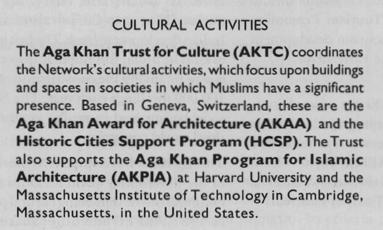
Three programmes carry out the Trust's principal activities. The Trust's principal activities. The Trust conducts the Aga Khan Award for Architecture, established in 1977 to premiate examples of architectural excellence in Muslim societies. Through grants it supports the Aga Khan Program for Islamic Architecture at Harvard University and the Massachusetts Institute of Technology, as well as the Program's parallel centres in the Muslim world. With its Historic Cities Support Program, the Trust supports revitalization projects that promote the conservation and re-use of historic sites in conjunction with related programmes of economic, social and cultural development. The Trust represents the cultural dimension of the Aga Khan Development Network.
Historically, the links between social welfare and cultural activity have been intense and complex, and improvements in the quality of life have been tied closely to the vitality of economic activity and enterprise. Through architecture and the built environment, the Trust's programmes are integral parts of the Network in the developing world.
For further information, contact: Mr. John de Monchaux
General Manager
Aga Khan Trust for Culture
Chemin des Crets-de-Pregny 32
CH-1218 Geneva, Switzerland
TEL:+41-22-798 90 70
FAX:+41-22-798 93 91
Aga Khan Award for Architecture
 Soekarno-Hatta Airport (Indonesia) wins one of 1995 awards
Soekarno-Hatta Airport (Indonesia) wins one of 1995 awards
 Haj Terminal, Saudi Arabia
Haj Terminal, Saudi Arabia
 Press clippings
Press clippings
 Aga Khan Visual Archives
Aga Khan Visual Archives
It was the Aga Khan's own involvement in construction in developing countries during the 1960s and 1970s that evoked his concern with deteriorating architectural heritage an in appropriate building practices in many Muslim societies. To sensitize those who build in the developing world to the unique heritage of Muslim history and architecture, the Aga Khan Award for Architecture (AKAA) was founded in 1977.
The goal of the Award is to recognize outstanding architectural achievements in all the different cultures and communities of the Muslim world. It seeks to identify examples of excellence in all areas of building and design, including social housing, community development, restoration, re-use and area conservation, as well as landscaping and concern for the environment. Through its efforts, the Award hopes to encourage design concepts that successfully address the needs and hopes of Muslim communities today.
The Award is granted at the conclusion of a three cycles of nomination, project documentation, screening and technical review. Screening and the final selection of winners of the US $500,000 prize are carried out by an independent Master Jury. During the Award's first five cycles, the prize has been shared by projects ranging from social housing to restoration,and buildings as diverse as the mud brick mosque in Yaama, Niger and the Institute du Monde Arabe in Paris. Since the establishment of the Award, a special Chairman's Award has been conferred twice, in recognition of the lifetime achievements of noted Muslim architects Rifat Chadirji and the late Hassan Fathy.
The Award aims to reflect all the cultures of the Islamic world, and to stimulate dialogue concerning architecture and design. As part of the three year award cycle, it holds regional and international seminars that bring together architects, historians sociologist and planners to study trends in building throughout the Islamic world.
Aga Khan Program for Islamic Architecture
 Program details (at Harvard/MIT)
Program details (at Harvard/MIT)
 Aga Khan Visual Archives (Islamic Architecture) at MIT's Rotch Library
Aga Khan Visual Archives (Islamic Architecture) at MIT's Rotch Library
Historic Cities Support Program
The Trust's most recent initiative is the Historic Cities Support Program (HCSP). It was established to promote the conservation and re-use of buildings and public spaces in historic cities in ways that can catalyses social, economic and cultural development. In HCSP's approach, the restoration and rehabilitation of buildings and public spaces cannot be conceived apart from broader processes of community development. Its project briefs go beyond technical restoration to address the questions of re-use and community revitalization.
The first project to be completed under this program was the restoration of the fourteenth century Zafra House in the old Arab quarter of Granada, Spain now the home for the Centre for Historic Studies of Granada and its Kingdom. Currently the Historic Cities Support Program is involved in revitalization projects in four very different settings in the Islamic world:the Old Stone Town of Zanzibar, Karimabad in the Northern Areas of Pakistan and Cairo.
On the island of Zanzibar, a HCSP project aims to link the preservation of the Old stone Town's unique architectural heritage with the revival of the Zanzibar economy through tourism. The town of Karimabad, in the Northern Areas of Pakistan, is the site of a similar attempt to combine conservation and economic development-there, the restoration of Baltit Fort is taking place within a frame work that includes both the re-use of the Fort and Karimabad's urban and economic development. As in Zanzibar, the creation of lasting partnerships is one of the goals of the project, which is bringing together the local community, national Government, and domestic and international non-governmental organization. HCSP is also concerned with the preservation, creation and upkeep of public spaces. In Cairo it is drawing together a coalition of partners for the creation of a new public space, the AL-Azhar park near Cairo's historic citadel.